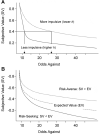A systematic review and meta-analysis on the clinical implications of probability discounting among individuals with Internet gaming disorder
- PMID: 33542406
- PMCID: PMC7862357
- DOI: 10.1038/s41598-021-82822-z
A systematic review and meta-analysis on the clinical implications of probability discounting among individuals with Internet gaming disorder
Abstract
The significance of probability discounting (PD) among individuals with Internet gaming disorder (IGD) remains unclear. Following the PRISMA guidelines, we systematically searched the PubMed, Embase, and ScienceDirect databases for English articles on Internet addiction that included comparison between individuals with and without IGD as well as probabilistic discounting task as the main outcome from January 1970 to July 2020 using the appropriate keyword strings. The primary outcome was the overall difference in rate of PD, while the secondary outcomes included the difference in PD with magnitude of probabilistic reward and response time of the PD task. Effect size (ES) was calculated through dividing the group means (e.g., h value or AUC) by the pooled standard deviations of the two groups. A total of five studies with 300 participants (i.e., IGD group, n = 150, mean age = 20.27 ± 2.68; healthy controls, n = 150, mean age = 20.70 ± 2.81) were analyzed. The IGD group was more willing to take risks in probabilistic gains but performances on probabilistic losses were similar between the two groups. The IGD group also exhibited a shorter response time (Hedge's g = - 0.51; 95%CI = - 0.87 to - 0.15). Meta-regression demonstrated a positive correlation between maximum reward magnitude and PD rate (p < 0.04). However, significant publication bias was noted among the included studies (Egger's test, p < 0.01). In conclusion, individuals with IGD seemed more impulsive in making risky decisions, especially when the potential gains were expected. Our findings not only supported the use of PD for assessing individuals with IGD but may also provide new insights into appropriate interventions.
Conflict of interest statement
The authors declare no competing interests.
Figures






References
-
- American Psychiatric Association, ed. Diagnostic and Statistical Manual of Mental Disorders. Fifth edition ed. American Psychiatric Publishing: Arlington, VA. (2013)
-
- The World Heath Organization. 6C51 Gaming Disorder. https://icd.who.int/ Accessed August 18, 2020 (2019).
Publication types
MeSH terms
LinkOut - more resources
Full Text Sources
Other Literature Sources

